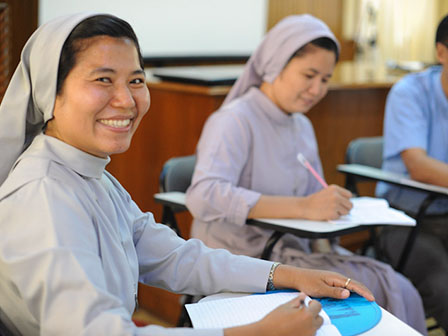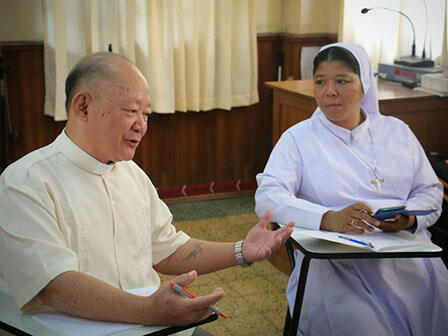Around 60 bishops, priests, nuns and other faith based representatives from communities within the Roman Catholic Church in Myanmar also referred to as the Catholic Bishops’ Conference of Myanmar (CBCM) attended a United Nations Population Fund (UNFPA) organized four day census orientation training from 25-28 May 2015 in Yangon.

The training is part of wider advocacy efforts to promote transparency of the census process by engaging directly with local civil society organisations (CSOs) and faith based communities in Myanmar. The objective of the training was to raise awareness and understanding of the census process prior to the release of the main census data on 29 May as well as to clarify any misconceptions and doubts which might linger amongst the public.
Ms. Janet Jackson, UNFPA Representative in Myanmar said in her opening remarks that the 2014 Housing and Population Census was one of the largest contributions to development in Myanmar in recent times. "For the first time in over 30 years Myanmar has access to credible and reliable data that is needed for future development planning and policy making. The census data shows how and where services across Myanmar are needed to be improved, such as health care, education and utilities."
Ms. Jackson said that a census is "critical for a country to move forward in terms of democracy and development planning and policies and it can help spur on the on-going reform." She urged the participants to interact with their congregations on how to use and implement the census data in their areas. She also expressed her heartfelt congratulations on the recent appointment of Myanmar's first Roman Catholic Cardinal, his Eminence Charles Maung Bo.
Sister Mary Rose, a 36 year-old nun based in Kayah State, said the training was a valuable experience. "I wanted to attend the census training, because the only thing I knew about the census was what I had read on the internet, which was very negative. This is because they did not understand why the enumerators were asking so many questions, but now it is very clear to me and I can tell everyone in my community that they no longer have to be afraid of the census and that it is safe," she said.

She added that the Catholic Church community also collects information on how many people live within each diocese. "Each year I collect together with the parish priest the data of the members living in my congregation similar like they did for the census. It will be my responsibility to share with everyone the knowledge and output I have learnt from the training. I can use the group work and methodology to implement for our own count as well as to inform about the census". Loikaw, Kayah state is said to be home to one of Myanmar's largest Catholic communities. The Catholic Bishops' Conference of Myanmar consists of 16 dioceses across the country.
The participants worked in small discussion groups relating to the main census data thematic areas such as education, disability, occupation, population size, fertility, mortality and household characteristics which they at the end of the four days presented to the group.
Father John, a 62 year-old priest from Bhamo, Kachin State said after the training he now understood that the purpose of the census is to provide various kinds of data on the population as well as why it is so important. "In the exercises we talked about what kind of national policies which are needed in order to develop our communities such as social and security, including increasing job opportunities and dealing with issues relating to the generation gap and ageing," he said. Father John also stated that he would like to organize a yearly meeting for the annual Catholic count of his parish and implement the good standards which he had learnt at the census training.



